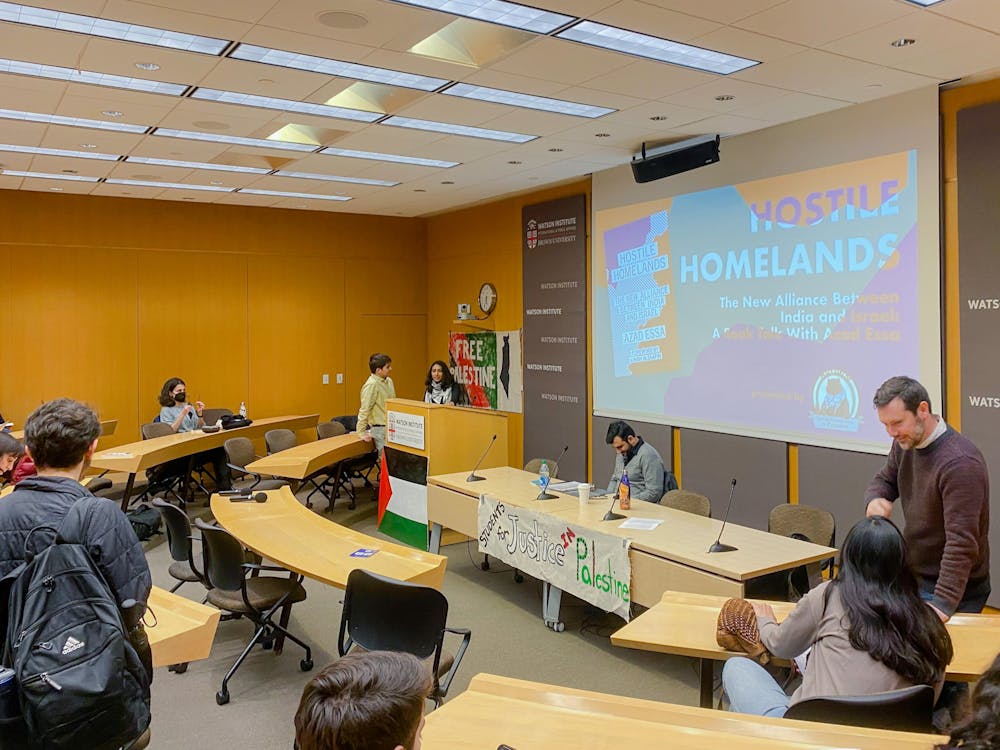Azad Essa, a reporter for the Middle East Eye, discussed the relationship between Zionism and Hindutva at a Thursday event hosted by Students for Justice in Palestine.
At the event, Essa discussed his new book titled “Hostile Homelands: The New Alliance Between India and Israel.” His book examines the foreign policy approaches of Israel and India and the influences of Zionism and Hindutva on the two states, respectively. Essa traces the history of India’s views toward Israel and the culmination of their political relationship in the book.
Essa explained that his upbringing in South Africa at the end of apartheid motivated him to write the book. “I was very drawn to my Indian heritage,” he said. “I was very proud that the Indian National Congress became the first institution to boycott (apartheid) South Africa.”
But when he conducted additional research into India’s political history, his pride faded, he said.
He highlighted the Indian government’s militaristic actions in Kashmir and said that learning about it was another inspiration to write his book, adding that he hoped to discuss Kashmir in the book as a result.
Throughout the event, Essa drew parallels between the ideologies of Zionism and Hindutva.
The Oxford English Dictionary defines Zionism as “originally: a movement among Jewish people for the re-establishment of a Jewish nation in Palestine,” and “later: a movement for the development and protection of the state of Israel.” It defines Hindutva as “originally a major tenet of Hindu nationalist ideology, and presently, “an ideology advocating, or movement seeking to establish, the hegemony of Hindus and Hinduism within India.”
Essa argued that both ideologies are “exclusionary” and “expansionist” with the goal of building “nations or states with a single culture.”
He also discussed the military and industrial connections between Israel and India. Despite early support for Palestine from Indian leaders — including former Prime Minister Jawaharlal Nehru and Indian revolutionary Mahatma Gandhi — Israel and India developed a close relationship dating back to arms deals between the countries in 1962, Essa said.
Essa explained his view that discussions around Israel-Palestine often unnecessarily center the U.S. rather than the region itself. “If you are going to think about Palestine, and you’re not going to think about the other people that are a part of the story, … you are missing another chunk of the puzzle,” he said.
The event took the form of a conversation between Essa and Alex Winder, visiting assistant professor in Middle East studies. In an email to The Herald, he praised “Hostile Homelands” for adding additional global context to Israel-Palestine that Americans may not experience.
“Too often in the United States we … tend to focus on what’s happening in the rest of the world only insofar as it is connected to the U.S,” Winder wrote. “So to the extent we care about India, it's because of U.S.-India relations; and we can say the same for Israel and so on.”
“By decentering the U.S. (though certainly not ignoring it), ‘Hostile Homelands’ allows certain other kinds of relationships and rivalries to become visible in new ways: whether that's the role of certain Gulf states in Asia or the role that both Israel and India play in Africa,” he added.
Matteo Papadopoulos ’26, who attended the talk, said that while he considers himself informed on Israel-Palestine and related issues, Essa’s talk offered fresh insights. “It was nice to be presented with a refreshing take on parallels that I hadn't previously considered,” he said.

Ryan Doherty is the managing editor of digital content and vice president of The Herald's 135th editorial board. He is a junior from Carmel, NY who is concentrating in chemistry and economics. He previously served as a university news and science & research editor, covering faculty and higher education.





